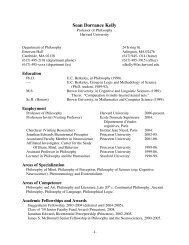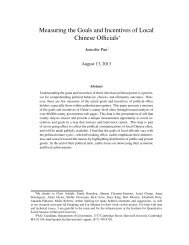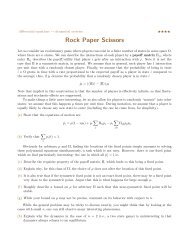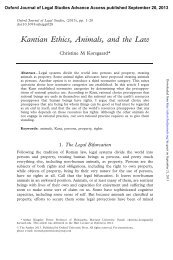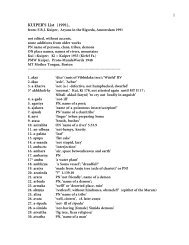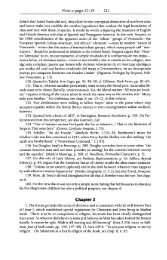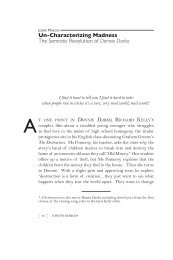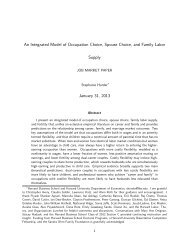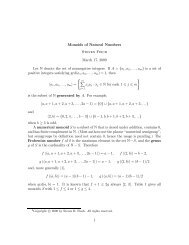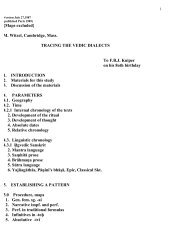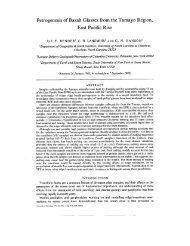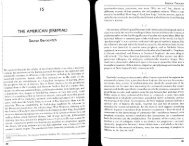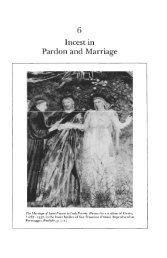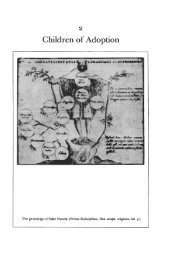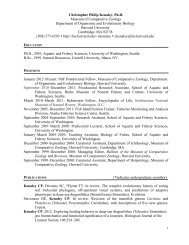references - people.fas.harvard.edu - Harvard University
references - people.fas.harvard.edu - Harvard University
references - people.fas.harvard.edu - Harvard University
You also want an ePaper? Increase the reach of your titles
YUMPU automatically turns print PDFs into web optimized ePapers that Google loves.
for the Augsburg tercentenary. 8 Was Mendelssohn’s<br />
motivation truly sincere or career-related? Did he,<br />
with all the family’s fi nancial resources and moral<br />
support at his disposal, and approaching the crest<br />
of international renown really need to engage in a<br />
political charade of this magnitude? The composer’s<br />
heritage merits examination will help clarify his motivations.<br />
Felix’s grandfather Moses was the sole Jewish<br />
philosopher whose impact shaped the future of<br />
contemporary Jewish-Christian relations. For his descendants,<br />
and for Germans in general, he was better<br />
understood as a philosopher rather than as a specifi<br />
cally Jewish fi gure. Nearly a century ahead of his<br />
time, he argued, as had many of his contemporaries,<br />
for the separation of church and state, claiming that<br />
social equality—a given in natural law—could never<br />
be achieved until this was enacted. Through learning<br />
and acculturation, by translating the Torah into<br />
Judeo-German (Judendeutsch, an admixture of German<br />
and Hebrew, written in the Hebrew alphabet),<br />
with side-by-side commentary in Hebrew, by insisting<br />
on the abandonment of Yiddish in favor of German,<br />
and by fi ghting for Jewish civil and political<br />
rights, he strove to evict his fellow Jews from the<br />
ghettos into the mainstream of German society, all<br />
the while preserving the integrity and inherent dignity<br />
of the Jewish faith. His enlightened, objective<br />
writings on the rationalist nature of Judaism as a conduit<br />
toward social harmony won the favor and friendship<br />
of the most illustrious philosophical thinker of<br />
his time, Gotthold Lessing (1729-81), and thwarted<br />
attempts by the Swiss zealot Johan Kaspar Lavater<br />
(1741-1801) to publicly undermine his faith in a futile<br />
attempt to convert him. In his play Nathan der<br />
Weise (1779)—for which Felix expresses unstinting<br />
admiration in his celebrated letter of March 28, 1834<br />
to his father—Lessing incorporated the persona of<br />
Moses Mendelssohn into that of the protagonist as<br />
a plea for religious understanding, tolerance, and<br />
peaceful coexistence. Felix, in turn, would be infl u-<br />
8 See Michael P. Steinberg, “Mendelssohn and<br />
Judaism,” in The Cambridge Companion to Mendelssohn, Cambridge:<br />
Cambridge <strong>University</strong> Press, 2004, passim.<br />
ces papers - open forum # 6, 2011<br />
enced by the greatest and most liberal German Protestant<br />
theologian of the nineteenth century, Friedrich<br />
Schleiermacher (1768-1834) of the <strong>University</strong> of<br />
Berlin; during the last years of Schleiermacher’s life,<br />
the two became quite close.<br />
Moses Mendelssohn’s writings had in all<br />
likelihood accelerated the spiritual and intellectual<br />
trajectory that, over time, largely succeeded in bridging<br />
the Jewish culture with that of Christian Europe.<br />
Through his personal example, Felix’s grandfather<br />
inspired his co-religionists to do the same. It worked,<br />
and all too well: Within the 150 years that followed<br />
his death, Jews came to enjoy such prominent roles<br />
in German and European life, that their attempts to<br />
assimilate via conversion met with crescendi of resentment,<br />
jealousy, and hatred that resulted in the<br />
Holocaust. Felix’s father, a cultured pragmatist rather<br />
than an a pure intellectual, understood that to avoid<br />
being called “Jewboy” and having stones thrown at<br />
him and his siblings, conversion, especially by one<br />
of Germany’s best-known families, would enhance<br />
relations with the Christian community. 9 But did conversion<br />
really help the Mendelssohn family gain acceptance<br />
into German society? For acceptance into<br />
the world of commerce was not an issue. Their quest<br />
for acceptance, more than their need for residency<br />
rights and citizenship, must have evolved into a psychological<br />
obsession or emotional need. 10 On more<br />
than one occasion Abraham, who had enjoyed living<br />
in Paris between 1797 and 1804, contemplated leaving<br />
anti-Semitic environment of Berlin to return once<br />
and for all to the City of Lights. His celebrated letter<br />
to Fanny shortly after her conversion advises that<br />
Christianity was—at least for him—“the religion of<br />
most civilized <strong>people</strong>,” 11 for having supplanted Judaism<br />
in that role. To this point, I query what Abraham<br />
meant by “civilized.” Who were the “uncivilized,”<br />
and what, for him, constituted “civility,” if only to<br />
9 See Sebastian Hensel, The Mendelssohn Family<br />
(1729-1847); From Letters and Journals, Vol. 1, 25; trans. Carl<br />
Klingemann. New York: Harper & Bros., 1882.<br />
10 See Silber, 39-41.<br />
11 See Peter Mercer-Taylor, The Life of Mendelssohn,<br />
Cambridge: Cambridge <strong>University</strong> Press, 2000, 30-32.<br />
5



